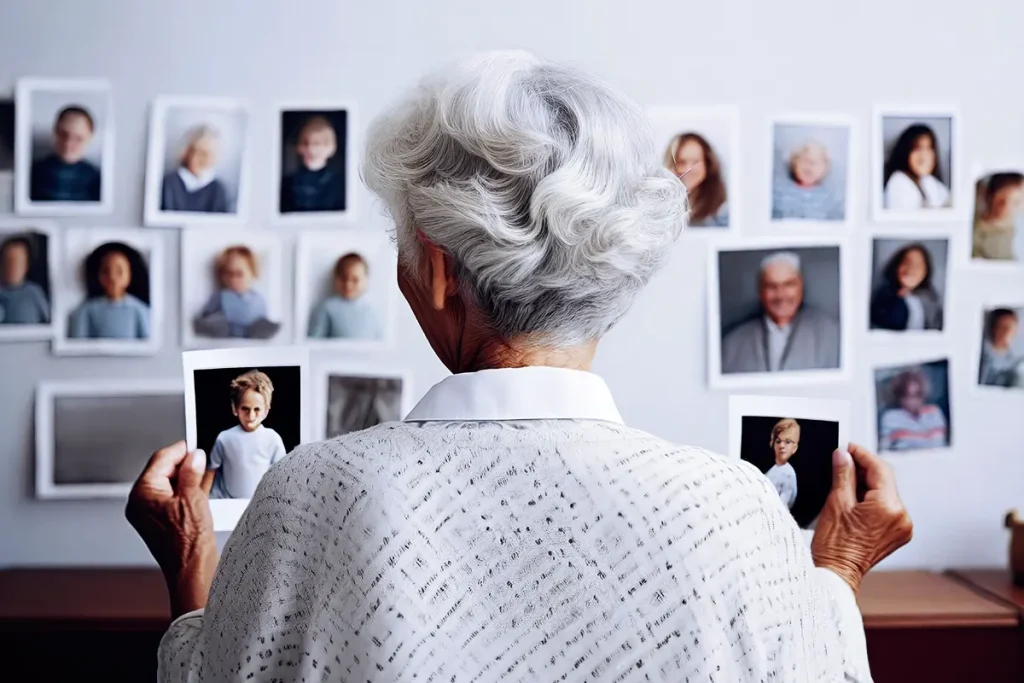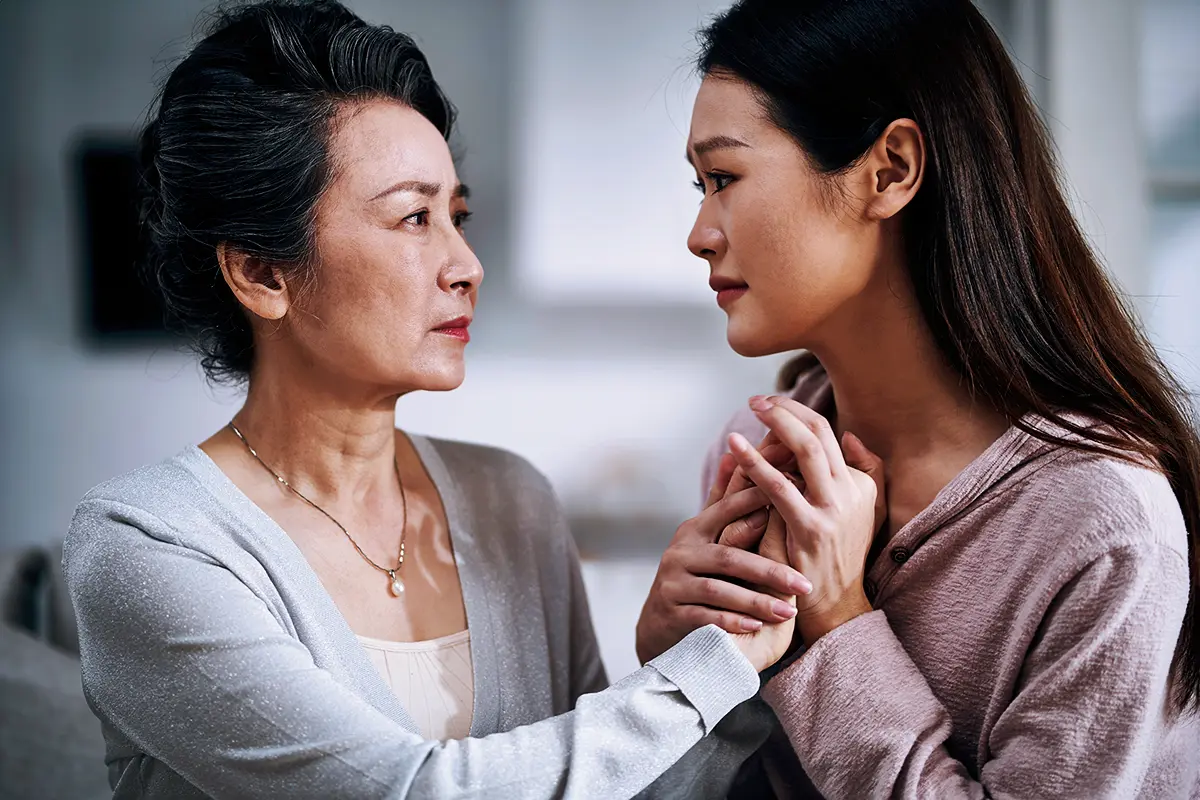Sarah’s fingers trembled as she reached for the door handle of her childhood home. The familiar scent of her mother’s rose garden wafted through the air, a bittersweet reminder of happier times. But as she stepped inside, the weight of her new reality settled heavily on her shoulders. The house, once a haven of warmth and laughter, now stood as a silent witness to the relentless march of dementia.
“Mom?” Sarah called out, her voice wavering. “It’s me, Sarah. I’m here.”
A moment of silence, then a tentative reply. “Sarah? Is it time for breakfast already?”
Sarah’s heart clenched. It was 4 PM, and she had just spoken to her mother on the phone an hour ago. This was the emotional rollercoaster of caregiving that had become her daily life, a journey through the shadows of forgetfulness that tested her strength, patience, and love in ways she never imagined.
As we embark on this exploration of the dementia caregiver experiences, we’ll navigate the complex terrain of emotions, relationships, and daily challenges that define this profound journey. From the gut-wrenching moments of anticipatory grief to the unexpected bursts of joy, we’ll shed light on the often-overlooked emotional landscape of those who walk alongside their loved ones through the fog of cognitive decline.
This is not just a guide; it’s a companion for the countless individuals who find themselves in the dual role of child and parent, spouse and nurse, friend and lifeline. Through intimate stories, expert insights, and practical strategies, we’ll equip you with the tools to not only survive this demanding journey but to find moments of beauty, growth, and connection along the way.
Overview:
- Understand the complex emotional realm of dementia caregiving, including guilt, grief, and unexpected moments of joy.
- Learn practical strategies for maintaining your own well-being while providing compassionate care.
- Discover how to navigate changing relationships and family dynamics in the wake of a dementia diagnosis.
- Explore techniques for building a robust support network and advocating effectively in the healthcare system.
- Gain insights into preparing for the future, including legal, financial, and end-of-life considerations.
- Find ways to preserve your own identity and find meaning in the caregiving journey.
The Emotional Rollercoaster of Caregiving
Sarah slumped into the worn armchair in her parents’ living room, her eyes burning with unshed tears. The day had been a whirlwind of doctor’s appointments, medication schedules, and moments of heart-wrenching confusion from her mother, Margaret. As she sat there, trying to catch her breath, a tidal wave of emotions crashed over her – love, frustration, guilt, and a grief so profound it threatened to swallow her whole.
“Honey?” Robert, Sarah’s father, appeared in the doorway, his own face etched with worry. “Tough day?”
Sarah nodded, unable to find words. Robert crossed the room and placed a comforting hand on her shoulder. “You know, it’s okay to feel… whatever it is you’re feeling. I’m right there with you.”
His words opened a floodgate. Sarah found herself pouring out her conflicting emotions – the deep love she felt for her mother, the frustration at the constant repetitions and confusion, the guilt over moments of impatience, and the overwhelming grief for the vibrant woman her mother used to be.
Robert listened, his eyes misty. “I know, sweetheart. I feel it too. But you know what your mother would say if she could see us now? She’d tell us to buck up and find something to laugh about.”
As if on cue, a crash sounded from the kitchen. They rushed in to find Margaret standing amidst a sea of pots and pans, looking bewildered but oddly pleased with herself. “I was looking for the good china,” she announced proudly. “We’re having the Queen for tea, you know.”
For a moment, Sarah and Robert stood frozen. Then, almost against their will, laughter bubbled up. The absurdity of the moment, juxtaposed with their earlier heaviness, struck them as hilariously poignant. Margaret, delighted by their reaction though not understanding it, joined in.
In that moment of shared mirth, Sarah felt a shift. The weight on her shoulders didn’t disappear, but it lightened. She realized that amidst the challenges, there were still moments of joy to be found – unexpected, sometimes absurd, but precious nonetheless.
Later that evening, as Sarah helped her mother prepare for bed, she found herself paying closer attention to the small details – the familiar curve of her mother’s smile, the way her eyes lit up when she recognized a favorite song on the radio. These were the moments to cherish, Sarah realized, the threads of connection that remained even as memories frayed.
“You know, Mom,” Sarah said softly, brushing Margaret’s hair, “I’m learning so much from you, even now.”
Margaret turned, a flash of clarity in her eyes. “Oh, darling,” she replied, patting Sarah’s hand. “We’re learning together, aren’t we? It’s not always easy, but we’re doing it together.”
Sarah’s throat tightened with emotion. These lucid moments were becoming rarer, making them all the more precious. She savored the connection, knowing it might be fleeting.
As she drove home that night, Sarah’s mind whirled with the day’s events. The crushing lows, the unexpected highs, the constant undercurrent of love that ran through it all – this was the emotional landscape of caregiving. It was demanding, often heart-wrenching, but also punctuated by moments of profound connection and even joy.
She thought about the support group she’d been hesitant to join, wondering if sharing her experiences might help lighten the load. Perhaps it was time to reach out, to connect with others walking this same path.
As you navigate your own caregiving journey, consider: What unexpected emotions have surfaced for you? How do you find moments of joy or connection amidst the challenges? Remember, acknowledging and accepting the full spectrum of your feelings is not just okay – it’s an essential part of maintaining your own well-being as a caregiver.
The Changing Landscape of Relationships
The Johnson family dinner table, once a bustling hub of lively conversation and shared laughter, now stood as a poignant symbol of change. Sarah watched as her father, Robert, gently guided her mother to her seat, his movements a well-practiced dance of care and patience.
“There you go, my dear,” Robert murmured, his voice warm with affection. Margaret smiled up at him, a flicker of recognition in her eyes.
“Thank you,” she said softly, then turned to Sarah with a puzzled expression. “Are you staying for dinner, dear? It’s so nice of the neighbors to visit.”
Sarah felt the familiar pang in her chest but pushed it aside, forcing a smile. “It’s me, Mom. Sarah, your daughter. And yes, I’m staying for dinner.”
As they settled into the meal, Sarah couldn’t help but marvel at the way her parents’ relationship had evolved. The playful banter and shared inside jokes of the past had given way to this new dynamic – Robert as the steadfast caregiver, Margaret as the beloved but often confused recipient of his care. Yet beneath the changes, the current of love between them remained strong, perhaps even stronger than before.
Emily, Sarah’s teenage daughter, piped up from across the table. “Grandma, remember that cake recipe you used to make for my birthdays? I found it in your old cookbook. Maybe we could bake it together sometime?”
Margaret’s face lit up with delight. “Oh, yes! The one with the strawberries, wasn’t it? Your grandfather always said it was his favorite.”
For a moment, the years seemed to fall away, and Sarah glimpsed the mother she remembered. These moments of connection, however brief, were precious lifelines in the shifting seas of their new reality.
Later, as Sarah helped clear the dishes, she found herself in a quiet moment with her father. “How do you do it, Dad?” she asked, her voice barely above a whisper. “How do you handle the changes in your relationship with Mom?”
Robert paused, his hands stilling in the soapy water. “It’s not easy,” he admitted. “There are days when I miss the way things were so much it feels like a physical ache. But then I look at her, and I see the woman I fell in love with all those years ago. She’s still there, Sarah. Our relationship has changed, yes, but the love… that’s constant.”
Sarah nodded, blinking back tears. She thought about her own struggles – the guilt she felt when she got frustrated, the way she sometimes mourned the loss of the mother-daughter relationship she’d always envisioned for her adult years. Yet here was her father, showing her that love could adapt and endure.
The next day, Sarah found herself facing another aspect of this changing relational landscape. Her brother, Mike, was on the phone, his voice tight with frustration.
“I can’t just drop everything and come home every weekend, Sarah,” he was saying. “I have my own family, my job…”
“I know, Mike,” Sarah replied, trying to keep the irritation out of her voice. “But Mom and Dad need us. Both of us.”
The conversation ended with no real resolution, leaving Sarah feeling drained and alone. The unequal distribution of caregiving responsibilities was straining her relationship with her brother, adding another layer of stress to an already challenging situation.
Seeking some respite, Sarah decided to meet her friend Barbara for coffee. As they sat in the cozy café, Sarah found herself opening up about the challenges she was facing.
“I feel like I’m losing myself sometimes,” she confessed. “Between caring for Mom, trying to be there for Dad, managing my own family… where’s the space for just being Sarah?”
Barbara reached across the table, squeezing Sarah’s hand. “That’s why this coffee date is so important,” she said firmly. “You need to carve out these moments for yourself, to nurture your other relationships. It’s not selfish, Sarah. It’s necessary.”
As Sarah drove home, her friend’s words echoed in her mind. She realized that navigating this new landscape of relationships wasn’t just about adapting to the changes with her mother. It was also about maintaining connections with others, finding support, and yes, preserving her own sense of self.
She made a mental note to look into local caregiver support groups. Perhaps there, she could find others who understood this complex dance of changing relationships and roles. With the right support network, she hoped she could be better equipped to handle the challenges ahead, while maintaining the essence of the relationships that meant so much to her – including her relationship with herself.
How has your relationship with your loved one changed since you became a caregiver? In what ways have you found new methods of connection or expressions of love? Remember, adapting to these changes is a journey, and it’s okay to mourn what’s been lost while also appreciating the new dimensions of your relationship.

The Daily Dance of Care and Self-Care
The alarm blared at 5:30 AM, jolting Sarah from a fitful sleep. For a moment, she lay there, the weight of the day ahead pressing down on her. Then, with a deep breath, she swung her legs over the side of the bed and stood up. The daily dance was about to begin.
By 6:15, Sarah was at her parents’ house, helping her mother out of bed and into the bathroom. “Good morning, sunshine,” she said brightly, masking her own fatigue. Margaret looked at her blankly for a moment before a spark of recognition flickered in her eyes.
“Sarah, my Sarah,” she murmured, reaching out to touch her daughter’s cheek. “You’re such a good girl.”
The simple gesture nearly undid Sarah. She blinked back tears as she helped her mother with her morning routine, a complex choreography of medications, hygiene tasks, and gentle reminders.
As she worked, Sarah couldn’t help but notice the toll this daily routine was taking on her. The constant stress, the lack of sleep, the emotional labor – it was all adding up. She thought back to the conversation she’d had with Elena, the professional caregiver who came three times a week to provide respite care.
“You need to watch for signs of burnout,” Elena had warned her. “Exhaustion, irritability, neglecting your own health – these are red flags.”
Sarah ruefully acknowledged that she was probably waving several of those red flags right now. But how could she step back when her parents needed her so much?
Later that morning, as her father took over so she could head to work, Sarah found herself sitting in her car, unable to start the engine. The thought of facing another day at the office, trying to balance her professional responsibilities with the constant worry about her parents, felt overwhelming.
It was at that moment that Sarah remembered the self-care routine she’d stumbled across in a caregiver forum. Taking a deep breath, she closed her eyes and ran through a quick mindfulness exercise. Then, she reached for the water bottle and granola bar she’d stashed in her bag – a small but significant act of self-care.
As she drove to work, Sarah’s mind wandered to the support group meeting she’d finally worked up the courage to attend the previous week. She’d been surprised by how much it helped to simply be in a room full of people who understood, who didn’t judge her for the complex mix of love, resentment, guilt, and exhaustion she felt.
One of the group members, Tom, had shared a perspective that stuck with her. “Taking care of yourself isn’t selfish,” he’d said. “It’s like the oxygen mask on an airplane. You have to secure your own before you can help others.”
Sarah realized she needed to take this advice to heart. She made a mental note to talk to her employer about flexible work options. Maybe she could work from home a few days a week, allowing her to be closer to her parents while still maintaining her professional life.
That evening, as she prepared dinner for her parents, Sarah found herself humming softly. The simple act of cooking, of creating something nourishing, felt like a small victory. She was startled out of her reverie by her father’s voice.
“You know, you remind me so much of your mother,” Robert said, his eyes misty. “She always used to hum while she cooked.”
Sarah smiled, a bittersweet ache in her chest. “I learned from the best,” she replied.
As they sat down to eat, Sarah noticed her mother watching her intently. “You look tired, dear,” Margaret said, in one of her moments of clarity. “Are you getting enough rest?”
The irony of the situation wasn’t lost on Sarah. Here she was, exhausted from caregiving, being asked by the person she was caring for if she was taking care of herself. It was a poignant reminder of the need to maintain her own well-being.
That night, instead of staying up late to catch up on chores, Sarah made a conscious decision to go to bed early. As she lay there, she reflected on the daily dance of care and self-care. It wasn’t about achieving perfect balance – that seemed impossible in the face of dementia’s unpredictable nature. Rather, it was about finding small moments of self-care within the demanding routine of caregiving.
She thought about the support group, the respite care provided by Elena, the understanding of her employer. These were all threads in a safety net she was slowly but surely weaving for herself. And as she drifted off to sleep, Sarah made a promise to herself: to nurture these supports, to set boundaries where needed, and to remember that taking care of herself was not an indulgence, but a necessity.
In your own caregiving journey, how do you balance the demands of care with your own needs? What small acts of self-care could you incorporate into your daily routine? Remember, caring for yourself is not a luxury – it’s an essential part of being able to provide the best care for your loved one.
Navigating the Healthcare Maze
The sterile fluorescent lights of the hospital corridor seemed to buzz with an energy all their own, adding to the tension headache building behind Sarah’s eyes. She clutched a thick folder of medical records in one hand and her mother’s trembling fingers in the other as they made their way to yet another specialist appointment.
“Mom, it’s okay,” Sarah soothed, noticing Margaret’s increasing agitation. “We’re just going to talk to the doctor. Remember Dr. Chen? She’s very nice.”
Margaret nodded uncertainly, her eyes darting around the unfamiliar surroundings. Sarah took a deep breath, steeling herself for the conversation ahead. Over the past few months, she had learned that being an effective advocate for her mother’s healthcare meant being prepared, assertive, and always vigilant.
As they settled into the hard plastic chairs of the waiting room, Sarah’s mind wandered to the first time she had accompanied her mother to a doctor’s appointment after the dementia diagnosis. She had felt so overwhelmed, drowning in medical jargon and unable to articulate her concerns. Now, armed with knowledge from support groups, online research, and sheer experience, she felt more confident in her role as her mother’s voice.
“Sarah Johnson?” A nurse called, breaking into her reverie. “Dr. Chen will see you now.”
As they entered the office, Sarah noticed Dr. Chen’s warm smile falter slightly at Margaret’s confused expression. “Hello, Mrs. Johnson,” Dr. Chen said gently. “How are you feeling today?”
Margaret looked blankly at the doctor, then turned to Sarah. “Is it time for lunch?”
Sarah squeezed her mother’s hand reassuringly. “Not yet, Mom. We’re here to see Dr. Chen, remember? She’s going to help us figure out why you’ve been having trouble sleeping.”
Dr. Chen nodded approvingly at Sarah’s approach. “That’s right, Mrs. Johnson. Now, Sarah, can you tell me more about what’s been going on?”
As Sarah launched into a detailed description of her mother’s symptoms, sleep patterns, and medication schedule, she felt a surge of pride. She had come so far from that overwhelmed daughter fumbling with unfamiliar terms. Now, she was an integral part of her mother’s healthcare team.
The appointment progressed, with Dr. Chen patiently examining Margaret and discussing treatment options with Sarah. As they were wrapping up, Dr. Chen pulled Sarah aside.
“You’re doing an excellent job advocating for your mother,” she said softly. “But how are you holding up? Caregiver burnout is a real concern.”
Sarah felt a lump form in her throat at the unexpected kindness. “I’m… managing,” she replied, realizing as she said it how inadequate that response was.
Dr. Chen nodded understandingly. “I’m going to give you some information on caregiver support services. Please consider using them. Your well-being is crucial to your mother’s care.”
As they left the hospital, Sarah’s mind was already racing ahead to the next steps. She needed to update her father on the new medication regimen, schedule a follow-up appointment, and research the support services Dr. Chen had mentioned.
Later that evening, as Sarah was sorting through Margaret’s pill organizer, she felt a wave of exhaustion wash over her. The constant vigilance required to manage her mother’s healthcare was taking its toll. She thought back to a conversation she’d had with Tom at their last support group meeting.
“It’s like being the conductor of a very complicated orchestra,” Tom had said, describing his own experiences navigating his wife’s care. “You’ve got to keep all the sections playing in harmony – medications, appointments, symptoms, side effects. It’s overwhelming, but when it all comes together, it’s… well, not beautiful exactly, but there’s a sense of accomplishment.”
Sarah smiled at the memory. Tom’s analogy was apt. She did feel like a conductor sometimes, coordinating all aspects of her mother’s care. It was exhausting, yes, but also oddly empowering. She was making a difference, ensuring her mother received the best possible care.
Her reflections were interrupted by a call from her brother, Mike. “Hey, sis,” he said, his voice tinged with guilt. “How did Mom’s appointment go? Sorry I couldn’t be there.”
As Sarah filled him in on the details, she felt a familiar frustration bubbling up. Mike’s involvement in their parents’ care was sporadic at best, leaving her to shoulder most of the burden. But then she remembered advice from Amelia, the social worker she had consulted.
“Try to involve family members in ways that play to their strengths,” Amelia had suggested. “Not everyone can provide hands-on care, but they might be able to help in other ways.”
Taking a deep breath, Sarah decided to try a new approach. “Mike, I could really use your help with something. Could you research some of these new medications Dr. Chen prescribed? You’ve always been good at digging into the scientific details.”
There was a pause on the other end of the line. “Yeah, I can do that,” Mike replied, a note of relief in his voice. “Send me the names, and I’ll put together a report for you.”
As she hung up, Sarah felt a small weight lift from her shoulders. It wasn’t much, but it was a start towards a more collaborative approach to their parents’ care.
The next day, as Sarah accompanied her mother to a routine blood test, she found herself observing the phlebotomist’s technique with a critical eye. She had learned, sometimes the hard way, that even simple procedures could be challenging for someone with dementia.
“Could you use a butterfly needle?” Sarah asked politely. “Mom’s veins can be a bit tricky, and it tends to be less stressful for her.”
The phlebotomist looked surprised but nodded. “Good catch,” she said. “Are you in the medical field?”
Sarah chuckled. “No, just a very involved daughter.” As she watched the procedure go smoothly, with Margaret remaining calm throughout, Sarah felt a sense of validation. Her knowledge, hard-won through countless appointments and hours of research, was making a tangible difference in her mother’s care.
As you navigate the healthcare system for your loved one with dementia, what strategies have you found most effective? How do you balance being an advocate with taking care of your own needs? Remember, your role in your loved one’s healthcare team is invaluable – you are the expert on their day-to-day experiences and needs.
Building Your Support Network
Sarah stared at the flyer in her hand, her heart racing with a mix of anticipation and anxiety. “Dementia Caregivers Support Group – Every Wednesday at 7 PM,” it read. She had driven past the community center countless times, always finding an excuse not to stop. But today, something felt different. The weight of her responsibilities, the constant worry, the feeling of isolation – it had all become too much to bear alone.
Taking a deep breath, she pushed open the door and stepped inside. The room was warm and inviting, a circle of chairs arranged in the center. As people began to filter in, Sarah was struck by the diversity of the group. Young, old, men, women – dementia, it seemed, did not discriminate in choosing its caregivers.
“Welcome,” said a gentle voice. Sarah turned to see a woman with kind eyes and a tired smile. “I’m Linda. Is this your first time joining us?”
Sarah nodded, suddenly feeling overwhelmed. “I’m Sarah. I… I care for my mother. She has Alzheimer’s.”
Linda squeezed her arm reassuringly. “You’re in the right place, Sarah. We all understand what you’re going through.”
As the meeting began, Sarah found herself captivated by the stories shared around the circle. There was Tom, caring for his wife of 50 years; Elena, a professional caregiver who came to find support for herself; and Michael, a young man looking after his grandmother. Each story was unique, yet threaded with common themes of love, frustration, guilt, and resilience.
When it was her turn to speak, Sarah surprised herself by opening up about her struggles. The words poured out – her fear of losing her mother, the strain on her relationship with her brother, the constant juggling act between caregiving and her own life. As she spoke, she felt a weight lifting from her shoulders. Here, among people who truly understood, she didn’t have to pretend to have it all together.
After the meeting, as people mingled over coffee and cookies, Sarah found herself in conversation with Elena. “You know,” Elena said, “building a support network is like creating a safety net. It catches you when you feel like you’re falling.”
Sarah nodded, thinking about how isolated she had felt before coming to the group. “I guess I’ve been trying to do it all on my own for too long,” she admitted.
Elena smiled knowingly. “We all do at first. But remember, reaching out for help isn’t a sign of weakness. It’s a sign of strength and wisdom.”
Over the next few weeks, Sarah found herself looking forward to the Wednesday meetings. She began to form friendships with other members, exchanging phone numbers and meeting for coffee outside of the group. The support she found there gave her the courage to seek help in other areas of her life as well.
She reached out to her neighbors, explaining her mother’s condition and asking them to keep an eye out. To her surprise, they were more than willing to help. Linda from next door offered to sit with Margaret once a week so Sarah could have some time to herself. Another neighbor, an early retiree named John, volunteered to mow the lawn and do small repairs around the house.
Encouraged by these positive responses, Sarah decided to have a frank conversation with her employer. To her relief, her boss was understanding and offered flexible working hours and the option to work from home when needed. This small adjustment made a world of difference in managing her caregiving responsibilities.
Sarah also took Dr. Chen’s advice and looked into respite care services. She found a day program for seniors with dementia that Margaret could attend twice a week. Though it was difficult to leave her mother at first, Sarah soon saw the benefits. Margaret enjoyed the social interaction and activities, while Sarah had time to catch up on work, run errands, or simply rest.
One evening, as Sarah was helping her father prepare dinner, she noticed a change in him. He seemed more relaxed, more like his old self. “You know, Sarah,” he said, stirring the soup on the stove, “I can’t tell you how much it means to have your support. But I’m glad to see you’re finding support for yourself too.”
Sarah smiled, realizing how much her expanded support network had benefited not just her, but her entire family. The burden felt lighter when shared, and she found she had more patience and energy for the challenges that came her way.
At the next support group meeting, Sarah shared her experiences of building her support network. As she spoke, she saw nods of recognition and encouragement around the circle. When she finished, Tom spoke up.
“You’ve reminded us of something important, Sarah,” he said. “We’re not alone in this journey. And sometimes, the bravest thing we can do is ask for help.”
As the meeting wrapped up, Sarah felt a sense of belonging she hadn’t experienced in a long time. She was part of a community now, connected to others who shared her struggles and her triumphs. The road ahead was still challenging, but she no longer felt like she was walking it alone.
Think about your own support network. Who are the people you can turn to for help, understanding, or simply a listening ear? Are there untapped resources in your community that could provide support? Remember, building a strong support network is an ongoing process, and it’s never too late to start reaching out.

Preparing for the Road Ahead
Sarah sat at her kitchen table, a stack of legal documents before her, pen poised uncertainly over the paper. The weight of the decisions she was about to make felt almost unbearable. Planning for her mother’s future care needs, considering end-of-life wishes – it all seemed so final, so daunting.
A gentle hand on her shoulder startled her out of her reverie. It was her father, Robert, his eyes filled with a mix of sadness and resolve. “It’s not easy, is it?” he said softly. “But it’s necessary.”
Sarah nodded, blinking back tears. “I just… I feel like we’re giving up on Mom somehow. Like we’re planning for the worst instead of hoping for the best.”
Robert pulled up a chair beside her. “Oh, sweetheart,” he sighed, “this isn’t about giving up. It’s about being prepared. Your mother would want us to be practical, you know that.”
As they pored over the documents together – advance directives, power of attorney forms, long-term care insurance policies – Sarah felt a strange mix of emotions. There was sadness, yes, but also a sense of empowerment. They were taking control of what they could in a situation that often felt uncontrollable.
The next day, Sarah met with Amelia, the social worker who had been guiding them through this process. “How did it go with the legal documents?” Amelia asked gently.
Sarah took a deep breath. “It was hard,” she admitted. “But I think… I think it was also kind of healing, in a way. Like we’re honoring Mom by making sure her wishes are respected.”
Amelia nodded approvingly. “That’s a wonderful way to look at it, Sarah. Now, let’s talk about some practical aspects of future planning.”
They discussed potential changes to the home environment as Margaret’s condition progressed – grab bars in the bathroom, a medical alert system, possibly removing trip hazards. Sarah made mental notes, already thinking about how to implement these changes gradually, in a way that wouldn’t upset her mother’s sense of familiarity.
As their conversation turned to end-of-life care, Sarah felt her chest tighten. It was the hardest topic to face, but Amelia’s calm, matter-of-fact approach helped her work through it.
“Remember,” Amelia said, “discussing these issues now, while your mother can still participate in the conversation to some degree, is a gift. It allows you to honor her wishes and relieves you of some of the burden of decision-making later on.”
Later that week, at the support group meeting, Sarah shared her experiences with future planning. To her surprise, many members nodded in understanding.
“It’s like writing the final chapters of a book you don’t want to end,” Tom said thoughtfully. “But by doing it, you’re making sure the story gets the ending it deserves.”
Elena, the professional caregiver, added her perspective. “In my experience, families who plan ahead tend to feel more at peace when the difficult moments come. They’re not scrambling to make decisions in a crisis.”
As Sarah drove home that night, she found herself reflecting on the journey ahead. The road would be challenging, no doubt, filled with difficult decisions and emotional hurdles. But she felt more prepared now, armed with knowledge, support, and a clearer sense of direction.
At home, she found her mother sitting in her favorite armchair, looking through an old photo album. “Come sit with me, dear,” Margaret said, patting the seat beside her. “Let’s look at these pictures together.”
As they flipped through the pages, Margaret’s memories flickered in and out like a faulty light bulb. Some photos sparked vivid recollections, others drew blank stares. But in that moment, none of that mattered. They were together, mother and daughter, cherishing the present while honoring the past.
Sarah realized then that preparing for the road ahead wasn’t just about legal documents and practical arrangements. It was about making the most of the time they had left, creating moments of connection and joy amidst the challenges. It was about finding meaning and personal growth in the caregiving journey, even as they faced its inevitable conclusion.
As you consider the future in your own caregiving journey, what steps can you take to feel more prepared? How can you balance practical planning with making the most of the present moment? Remember, preparing for the future is an act of love – for your loved one, and for yourself.
Forge Ahead with Compassion and Resilience
As we conclude our journey through the emotional landscape of dementia caregiving, remember that you are not alone on this path. The challenges you face are real and significant, but so too are your strength, your compassion, and your capacity for growth.
Your next steps on this caregiving odyssey:
- Acknowledge and accept the full spectrum of your emotions. They are all valid and part of the journey.
- Prioritize self-care, even in small ways. Remember, you cannot pour from an empty cup.
- Reach out and build your support network. Consider joining a support group or reaching out to friends and family.
- Educate yourself about your loved one’s condition and become an advocate for their care.
- Plan for the future, but also find ways to cherish the present moments of connection.
Remember, the impact of your care extends far beyond the day-to-day tasks. You are providing comfort, dignity, and love in the face of a challenging disease. Your efforts matter, your feelings matter, and your well-being matters.
We invite you to share your own experiences, challenges, and triumphs in the comments below. Your story could provide comfort, inspiration, or valuable insights to others walking this path.
As you move forward, hold onto hope. Even in the shadows of forgetfulness, there is light – in the moments of connection, in the strength you discover within yourself, and in the community of caregivers who understand your journey. You are not just a caregiver; you are a beacon of love and compassion, lighting the way through the fog of dementia.
















